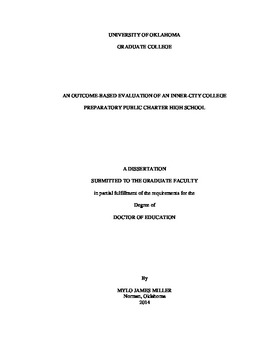| dc.contributor.advisor | Frick, William | |
| dc.contributor.author | Miller, Mylo | |
| dc.date.accessioned | 2014-04-24T14:58:47Z | |
| dc.date.available | 2014-04-24T14:58:47Z | |
| dc.date.issued | 2014-05-09 | |
| dc.identifier.uri | https://hdl.handle.net/11244/10330 | |
| dc.description.abstract | Racial and ethnic minorities are expected to increase in both number and percentage of the college-going population (Department of Commerce, 2009). Meanwhile the historic underrepresentation of low-income, African-American, and Latino students in the college population has a substantial effect on American society and the economy (Dancy & Brown, 2012). Lower rates of participation in postsecondary education by a growing minority population necessitate for many policy officials the creation of free public college preparatory charter high schools. The purpose of this study is to evaluate the effectiveness of a college preparatory public charter high school through the theoretical lens of social capital. This outcome based effectiveness evaluation study investigated the following: an inner-city college preparatory public charter high school’s effectiveness in reaching its pre-established, explicit goals: 1) organizational performance and value goals and 2) individual performance and value goals. The evaluation determined whether there were statistically significant differences in organizational performance and value and individual performance and value results between gender, socio-economic status, and ethnic groups in the senior class and if there were any significant relationships between measures of social capital, civic engagement, and student achievement results. This evaluation science study found that the college preparatory public charter high school was effective in terms of closing the opportunity gap through its social capital goals to prepare poor and minority students for post-secondary education. While this determination was important, there were significant differences in student achievement results for poor and minority students. The ascertained relationship between social capital measures and student achievement within the college preparatory public charter high school context implies that the opportunity gap for poor and minority students is being minimized. As student grade point averages went up so did the level of student social capital measures suggesting that the social capital goals of the college preparatory public charter high school made a difference in the academic outcomes of the students it serves. Additionally, there was an ascertained relationship between ACT scores and parent service hours which indicates an inferred relationship between parental involvement with and in the school context positively effects student achievement. The significant results linking social capital measures and parent service hours with student achievement provides theoretically-based knowledge about the potential of schools to be socially transformative rather reproductive. | en_US |
| dc.language | en_US | en_US |
| dc.subject | Education, Administration. | en_US |
| dc.title | AN OUTCOME-BASED EVALUATION OF AN INNER-CITY COLLEGE PREPARATORY PUBLIC CHARTER HIGH SCHOOL | en_US |
| dc.contributor.committeeMember | Houser, Neil | |
| dc.contributor.committeeMember | Covaleskie, John | |
| dc.contributor.committeeMember | Garn, Gregg | |
| dc.contributor.committeeMember | Maiden, Jeffrey | |
| dc.date.manuscript | 2014-02-24 | |
| dc.thesis.degree | Ed.D. | en_US |
| ou.group | Jeannine Rainbolt College of Education::Department of Educational Leadership and Policy Studies | |
